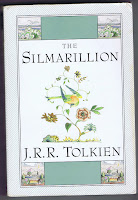So, its The Silmarillion again, eh?
I looked back and found that its only been three years or so since I read this last time. I also see that I read The Hobbit a few months earlier as well, but I didn't go on to read The Lord of the Rings then. It may be ten years or so since I've read them, but that probably has a lot to do with the movies that were made recently. So maybe I'll read them again, now that enough time has gone by that I don't see Legolas and Aragorn memes everyday on the internets.
I've read that Tolkien wanted to create a mythology for England, in the grand traditions of Greek, Roman, Asian, and Norse mythologies. Tall order, but I think he may have done it; and its in The Silmarillion that we can see this more so than in The Lord of the Rings. What smacks more of a mythology that an origin story after all? Buts its more than that; Quenta Silmarillion is the history of Middle-earth, and specifically the story of the Silmarils, whereas the book begins with Ainulindale and Valaquenta: 'The Music of the Ainur' and 'The Account of the Valar', respectively. These two chapters are short, but packed with information about the beginnings of the world. They are, together, like the narration at the beginning of a Shakespeare tragedy; they set the groundwork for the sorrow (and the joy, and triumph) that follows the formation of this new world from out of the void.
So I'm about half way through this re-read, and I had to put some notes down about it, having just finished 'Of Turin Turambar.' One of the most crushingly sad tales in this book. Not daunted by that description? Then there's more for you in the 2007 volume titled The Children of Hurin. The tale in The Silmarillion is just an abbreviated version of all that befalls Hurin's family once Morgoth actively pursues cursing him and his kin for standing up to him and siding with the elves.
More to come!

No comments:
Post a Comment
Say it, I want to hear it...